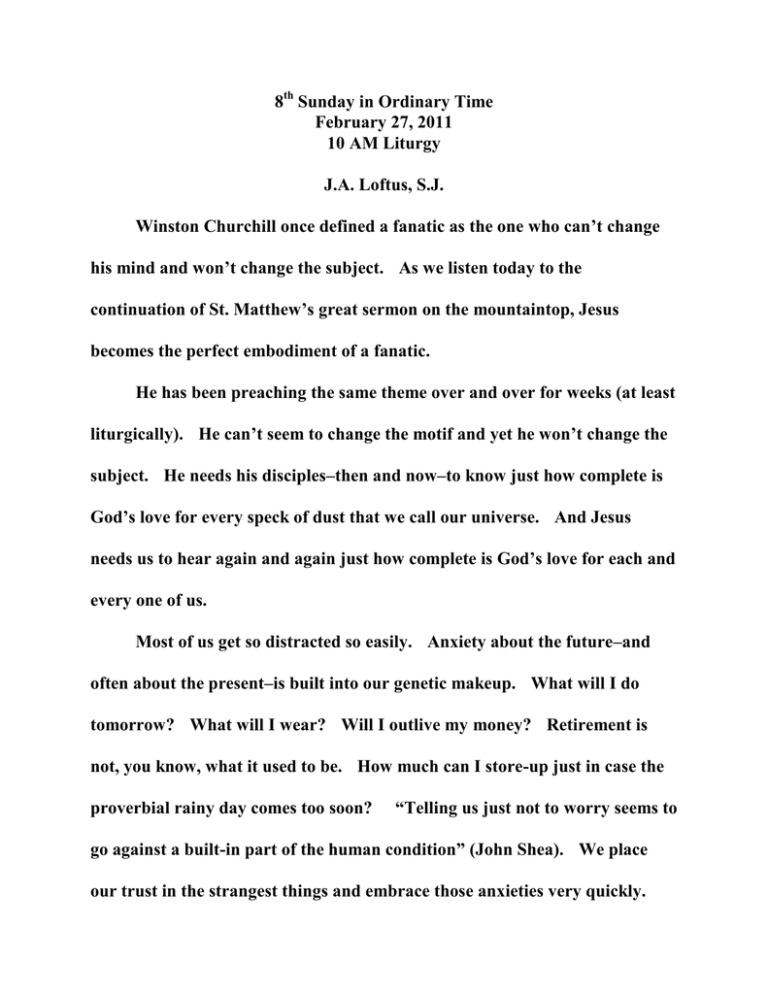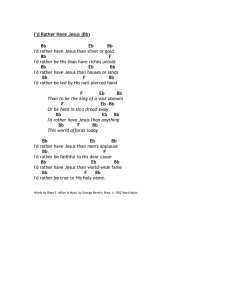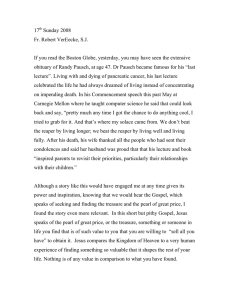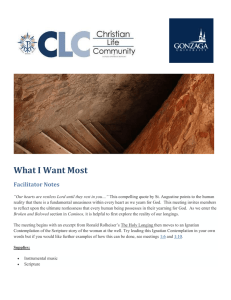8 Sunday in Ordinary Time February 27, 2011 10 AM Liturgy
advertisement

8th Sunday in Ordinary Time February 27, 2011 10 AM Liturgy J.A. Loftus, S.J. Winston Churchill once defined a fanatic as the one who can’t change his mind and won’t change the subject. As we listen today to the continuation of St. Matthew’s great sermon on the mountaintop, Jesus becomes the perfect embodiment of a fanatic. He has been preaching the same theme over and over for weeks (at least liturgically). He can’t seem to change the motif and yet he won’t change the subject. He needs his disciples–then and now–to know just how complete is God’s love for every speck of dust that we call our universe. And Jesus needs us to hear again and again just how complete is God’s love for each and every one of us. Most of us get so distracted so easily. Anxiety about the future–and often about the present–is built into our genetic makeup. What will I do tomorrow? What will I wear? Will I outlive my money? Retirement is not, you know, what it used to be. How much can I store-up just in case the proverbial rainy day comes too soon? “Telling us just not to worry seems to go against a built-in part of the human condition” (John Shea). We place our trust in the strangest things and embrace those anxieties very quickly. Only each of us can name for ourselves what we really put our trust in. Try it! Wanting money and security are not really bad things. Most of us would like more of each–just in case. So “mammon” is not in itself the enemy. But, at the same time, most of us realize the limits of money and security. “Money cannot secure you against death and by no means does it automatically bring happiness” (Shea). Most of us know that. But still.... Many of us do not know how to shed our anxieties about life, and the future, and death. And we face today an even more complicated challenge. Let me quote Oblate Father Ron Rolheiser’s take on our unique problem as post-modern Christians listening to Jesus today. “It seems we are good at being Christians when we are poor, unsophisticated, and oppressed. We’ve had centuries of practice at this. What we haven’t had much practice at is how to be Christians when we are affluent, sophisticated, and part of the cultural mainstream. We need a new kind of missionary, a new kind of saint, a man or woman who can live and preach the gospel effectively within a secularized context.” Where is Francis, Clare, Augustine, Ignatius when we really need them? Where do we find the kind of renewal that re-shapes the religious 2 imagination. “That doesn’t come out of think-tanks, conferences, and synods (it doesn’t even come from homilies); it comes from graced individuals–saints, wild men and women–who capture the romantic imagination” (Rolheiser). Who can teach us again to trust–to really trust–God’s care and love? Isaiah tries to help with today’s image of a nursing mother-God. (It’s one of the few explicit references to God-as-Mother in the Jewish scriptures.) The nursing Mother-God! Does that help some of the anxiety? St. Paul tries to help too. “It does not concern me in the least that I be judged by you or any human tribunal; I do not even pass judgment on myself...before the appointed time, until the Lord comes, for he will bring to light what is hidden in darkness...and then everyone will receive praise from God.” The Psalmist tries to help: “Rest in God alone, my soul.” For “Only in God will my soul be at rest. From God comes my hope, my salvation. God alone is my rock of safety, my strength, my glory, my God” (Trans. by John Foley, S.J.). God waits to praise us and not to condemn us, Paul tells us. God is that nursing mother-God who could never forget us, Isaiah tells us. And then we return to Jesus: “Do not worry about tomorrow; tomorrow will take 3 care of itself.” Yet I still wonder.... With our patron St. Ignatius, I pray today for all of us to have at least the desire to desire such trust. My old homiletics professor, Walter Burkhardt used to frequently remind us budding preachers: the problem with many preachers is that they confuse length with depth. So I will stop here and leave you all back with the liturgy composed and structured by a fanatic. He can’t change his mind, and he will not change the subject. Listen to Him. And desire to desire to trust more. Really, maybe we can do it–together. 4











